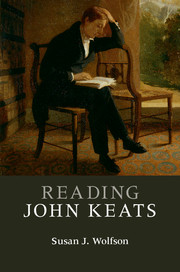Book contents
- Frontmatter
- Dedication
- Contents
- List of figures
- Preface
- Acknowledgments
- Note on the texts
- List of abbreviations
- 1 Life and times
- 2 Conceiving early poems, and Poems
- 3 Falling in and out of love with Endymion: A Poetic Romance; rereading King Lear
- 4 Venturing “new Romance”: Isabella; or, The Pot of Basil. A STORY FROM BOCCACCIO
- 5 Falling with Hyperion
- 6 Still Romancing: The Eve of St. Agnes; a dream-sonnet; Labelle dame
- 7 Reforming the sonnet and forming the Odes of spring 1819: Psyche; Nightingale; Grecian Urn; Melancholy; Indolence
- 8 Writhing, wreathing, writing Lamia
- 9 Falling in Fall 1819: The Fall of Hyperion and To Autumn
- 10 Late poems & lasting Keats
- A few famous formulations
- At a glance: Keats in context
- Notes
- Further reading
- Index
10 - Late poems & lasting Keats
Published online by Cambridge University Press: 05 June 2015
- Frontmatter
- Dedication
- Contents
- List of figures
- Preface
- Acknowledgments
- Note on the texts
- List of abbreviations
- 1 Life and times
- 2 Conceiving early poems, and Poems
- 3 Falling in and out of love with Endymion: A Poetic Romance; rereading King Lear
- 4 Venturing “new Romance”: Isabella; or, The Pot of Basil. A STORY FROM BOCCACCIO
- 5 Falling with Hyperion
- 6 Still Romancing: The Eve of St. Agnes; a dream-sonnet; Labelle dame
- 7 Reforming the sonnet and forming the Odes of spring 1819: Psyche; Nightingale; Grecian Urn; Melancholy; Indolence
- 8 Writhing, wreathing, writing Lamia
- 9 Falling in Fall 1819: The Fall of Hyperion and To Autumn
- 10 Late poems & lasting Keats
- A few famous formulations
- At a glance: Keats in context
- Notes
- Further reading
- Index
Summary
Late poems
Keats lived what he called a “posthumous existence” – not just in his sad last days in Rome but under such a shadow from early years on that even first poems come across as late-minded. A sonnet from January 1817, beginning “AFTER dark vapors have oppress'd our plains / For a long dreary season, comes a day / Born of the gentle SOUTH,” concludes its sweet catalogue of vernal promise with “a Poet's death.” In another untitled sonnet, written as he was finishing Endymion (31 January 1818), Keats renders that peculiar genre of pre-posthumous epitaph:
When I have fears that I may cease to be
Before my pen has glean'd my teeming brain,
Before high piled Books, in charactery,
Hold like rich garners the full ripened grain—
When I behold upon the night's starr'd face,
Huge cloudy symbols of a high romance,
And think that I may never live to trace
Their shadows with the magic hand of chance:
And when I feel, fair creature of an hour,
That I shall never look upon thee more,
Never have relish in the fairy power
Of unreflecting Love: then on the Shore
Of the wide world I stand alone and think
Till Love and Fame to Nothingness do sink.—
(K 97)The sonnet is imprinted with the temporal urgencies of Shakespeare's Sonnet XII (“When I do count the clock that tells the time”) and the echo in Milton's Sonnet XVI (“When I consider how my light is spent”), both fated for a reckoning volta (turn). But Shakespeare turns the count outward (“Then of thy beauty do I question make”), and Milton's When cues “patience to prevent / That murmur” (but not before seven lines).
- Type
- Chapter
- Information
- Reading John Keats , pp. 136 - 145Publisher: Cambridge University PressPrint publication year: 2015



